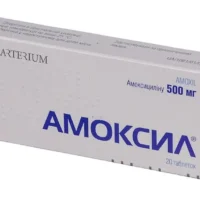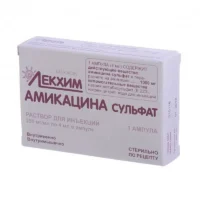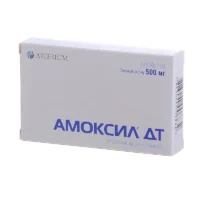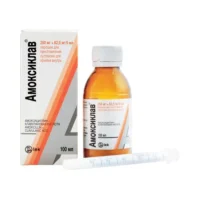Description
Doxiciclina Hydrochloride (Doxycycline) Capsules 100 mg. №10
Ingredients
Active ingredient: Doxiciclina hydrochloride (doxycycline) 100 mg per capsule.
Mechanism of Action
Doxycycline, a tetracycline antibiotic, acts by inhibiting bacterial protein synthesis through binding to the 30S ribosomal subunit, thereby preventing the addition of amino acids to the growing peptide chain.
Pharmacological Properties
Doxiciclina hydrochloride exhibits bacteriostatic activity against a wide range of gram-positive and gram-negative bacteria, as well as certain other microorganisms like Rickettsiae, Chlamydia, and Mycoplasma.
Indications for Use
Indications: Doxiciclina hydrochloride capsules are indicated for the treatment of respiratory tract infections, urinary tract infections, skin infections, acne, chlamydia, Lyme disease, and other bacterial infections susceptible to doxycycline.
Contraindications
Contraindications: Avoid use in patients with a known hypersensitivity to doxycycline or other tetracyclines. Use caution in children under 8 years old due to the risk of tooth discoloration and impaired bone growth.
Side Effects
Common side effects may include gastrointestinal disturbances, photosensitivity reactions, and vaginal candidiasis. Rare but severe adverse effects may involve hepatotoxicity, intracranial hypertension, and allergic reactions.
Usage Instructions
Dosage: The usual dose is 100 mg twice daily for the first day, followed by a maintenance dose of 100 mg daily. Administer with a full glass of water to prevent esophageal irritation. Avoid lying down for at least 30 minutes post-administration.
Benefits Compared to Analogues
Doxiciclina hydrochloride offers the advantage of a convenient dosing regimen and broad-spectrum antibacterial coverage compared to other antibiotics in the tetracycline class.
Suitable Patient Groups
This medication is suitable for adults and adolescents above 8 years of age. Use in elderly patients should be monitored closely due to the potential for increased drug interactions and susceptibility to adverse effects.
Storage and Shelf Life
Store in a cool, dry place away from direct sunlight. Do not refrigerate. Check the expiration date on the packaging and do not use the product beyond the stated shelf life.
Packaging Description
Doxiciclina hydrochloride capsules are typically packaged in blister packs of 10 capsules each, ensuring protection from moisture and contaminants.
Scientific Evidence
Doxycycline has been extensively studied and proven effective in the treatment of various bacterial infections, supported by clinical trials demonstrating its efficacy and safety profile.
Additional Information
Completing the full course of doxycycline treatment is crucial to prevent the development of antibiotic resistance and ensure the eradication of the infecting microorganism. Consult your healthcare provider for personalized guidance on treatment duration and adherence.
Prior to initiating doxycycline therapy, disclose all current medications and medical conditions to your healthcare provider to prevent potential drug interactions and adverse effects.





